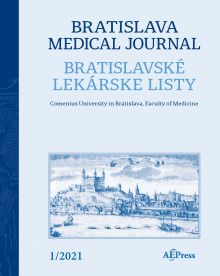Journal info
|
||||
Select Journal
Journals
Bratislava Medical Journal 2024 2023 2022 2021 2020 2019 2018 2017 2016 2015 2014 2013 2012 Ekologia - Ecology Endocrine Regulations General Physiology and Biophysics Neoplasma Acta Virologica Studia Psychologica Cardiology Letters Psychológia a patopsych. dieťaťa Kovove Materialy-Metallic Materials Slovenská hudba 2025Webshop Cart
Your Cart is currently empty.
Info: Your browser does not accept cookies. To put products into your cart and purchase them you need to enable cookies.
Bratislava Medical Journal Vol.121, No.11, p.817–821,2020 |
||
| Title: Ventricular repolarization indexes in patients treated with hydroxychloroquine – azithromycin combination for COVID-19 | ||
| Author: S. Gunay, S. Caliskan, D. Sigirli, E. Sahin | ||
| Abstract: BACKGROUND: Combination of hydroxychloroquine and azithromycin for the treatment of coronavirus disease 2019 (COVID-19) carries increased risk of corrected QT (QTc) prolongation and cardiac arrhythmias. OBJECTIVE: To characterize the ventricular repolarization indexes which are associated with malignant ventricular arrhythmias in patients treated with hydroxychloroquine and concomitant azithromycin for COVID-19. METHOD: A total of 81 patients who had hydroxychloroquine and azithromycin combination therapy because of possible or reverse-transcription polymertase chain reaction (RT-PCR) confirmed diagnosis of COVID-19 were included in the study. Baseline and control electrocardiograms (before and after treatment) were analyzed retrospectively. Tp-e interval, Tp-e/QT and Tp-e/QTc ratios, which are ventricular repolarization indexes, were calculated. RESULTS: While there was no significant increase in QTc interval in patients receiving combination therapy, there was a significant increase in ventricular repolarization indexes. CONCLUSION: The increase in ventricular replarization indexes is associated with the risk of arrhythmia. In patients using QTc prolonging medication for COVID-19 treatment, QTc monitoring alone may not be sufficient to follow-up for arrhythmia. Even if there is no prolongation in QTc, an increase in ventricular repolarization indexes may be seen (Tab. 5, Ref. 37). |
||
| Keywords: hydroxychloroquine, azithromycin, QTc prolongation, Tp-e, repolarization, arrhythmia | ||
| Published online: 09-Nov-2020 | ||
| Year: 2020, Volume: 121, Issue: 11 | Page From: 817, Page To: 821 | |
| doi:10.4149/BLL_2020_134 |
||
|
|
 download file download file |
|

